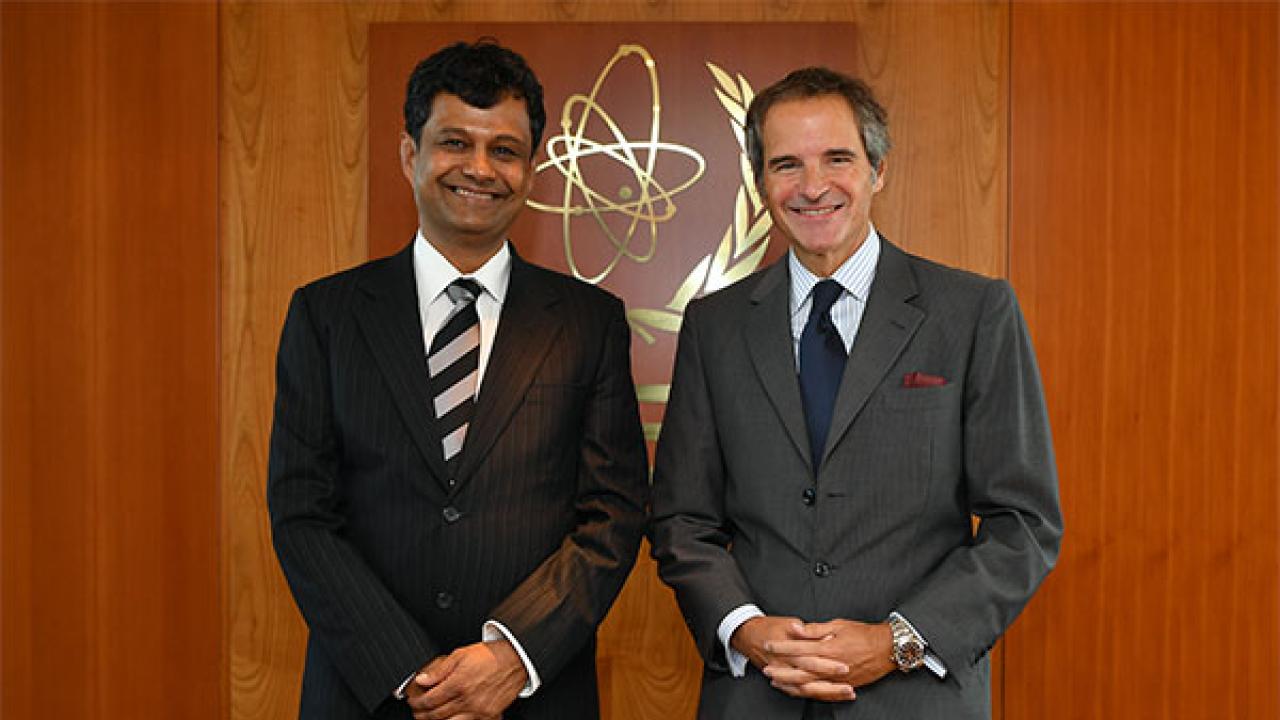
An ICTP delegation led by ICTP Director Atish Dabholkar was given a warm welcome this week at the International Atomic Energy Agency (IAEA) in Vienna. In a meeting with IAEA Director General Rafael Mariano Grossi, discussions focussed on continued collaborations and future plans.
ICTP has enjoyed the support and partnership of the IAEA from the Centre's very beginning. In the early years of ICTP, the IAEA's involvement shaped the Centre in numerous ways: contributing US $55,000 to the original ICTP budget; defining the original research focus of nuclear, plasma, and elementary particle physics; and providing staff and running the administration of the Centre until the mid-1990s. Although ICTP now operates under a tripartite agreement between the Italian Government, the IAEA and UNESCO, the IAEA continues to be deeply involved in the Centre's international programmes.
Because it enjoys close ties and enormous credibility throughout the developing world, ICTP, in a strategic partnership with the IAEA, serves as a unique intellectual conduit on subjects related to nuclear science and its applications. Working jointly, ICTP and the IAEA offer a variety of activities in support of research, education, training, and capacity building in developing countries, including training courses and workshops as well as fellowship programmes for young scientists. These activities focus on interdisciplinary applications of nuclear science and technology in areas crucial to socio-economical development such as energy, health, agriculture, industry, and environment protection. ICTP and the IAEA are also involved in joint activities to strengthen nuclear safety and security in developing countries.
Cooperation is carried out through the following activities:
- Organization of joint workshops and scientific events (10-12 per year): topics include nuclear knowledge management, physics and technology of innovative reactor systems, earthquake engineering for nuclear facilities, nuclear medicine, medical physics, extreme environmental events and risks to nuclear infrastructure, and materials science.
- Masters in Medical Physics programme: a two-year advanced postgraduate masters programme run jointly by ICTP and the University of Trieste, funded by IAEA and a perfect example of peaceful applications of nuclear science. To date, 122 graduates (39 females and 83 males) from 58 countries have completed the programme.
- ICTP-IAEA Sandwich Training Educational Programme (STEP): creates a pool of well-trained scientists and technologists who can address a wide range of challenges and ultimately help to educate and train subsequent generations of researchers at home. Agency fellows train at laboratories in Trieste, Vienna, Ljubljana or Monaco, as well as in other laboratories throughout Italy.
- Synchrotron light for Experimental Science and Applications in the Middle East (SESAME) programme: in the context of this regional synchrotron research centre, ICTP and IAEA provide support for scientists from the Middle East to train at established synchrotron facilities in Europe.
- ICTP-IAEA International School on Nuclear Security: trains professionals from developing countries, providing them with the fundamental nuclear security knowledge necessary to understand international requirements and measures to be taken in order to meet any obligations under the international nuclear security legal framework.
All of these activities ensure that the IAEA and ICTP's historic ties - and their commitment to "Atoms for Peace" - will be further strengthened in the future.
Photos from the visit can be viewed here.













